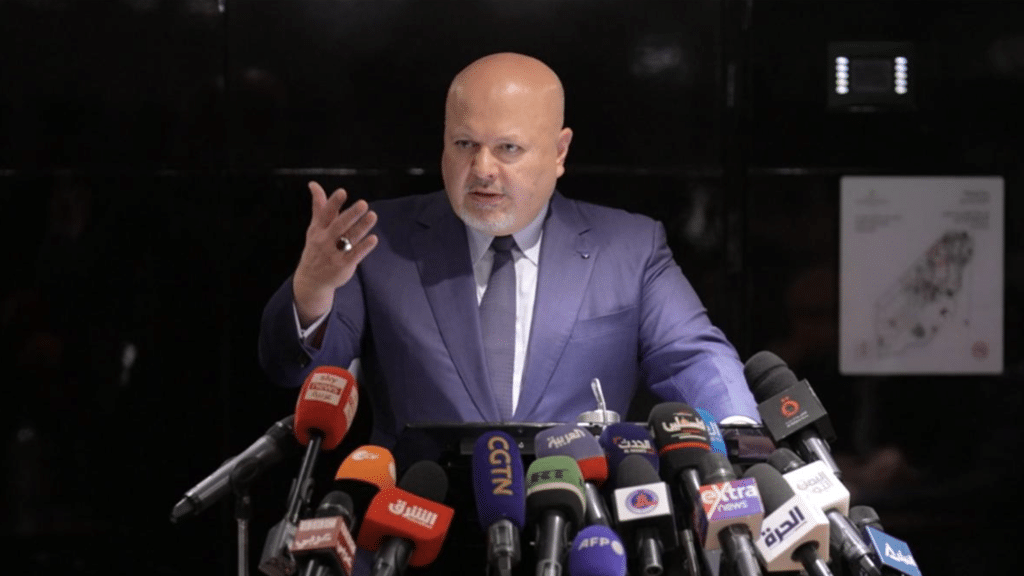
Karim Khan’s unprecedented politicization of the International Criminal Court since assuming the role of Prosecutor in June 2021 has significantly eroded the credibility of the Court just as he should be taking serious steps to address its declining legitimacy.
Khan delivered his inaugural briefing to the United Nations Security Council in his new role as ICC prosecutor in November 2021. The focus that day was on the “Situation in Libya,” one of only two current Council referrals to the court. Both cases — the other being Sudan (Darfur) — require the prosecutor to report to the Council every six months on the state of the Court’s investigations.
Before presenting his Libya report, Khan requested the Council’s “indulgence” to present his “vision.” It was one in which “the Rome Statute system and the Office that I lead can help to ensure that the tomorrows of our children are better than the yesterdays of so many of our fellow members of humankind.”
“I look forward,” he continued, to a “convergence” between the Council’s responsibilities and the ICC “to ensure that no safe haven is given for war crimes, crimes against humanity or genocide.”
Lest there be any ambiguity, Khan then repeated three times that he would prioritize only those cases referred to his office by the Council. “In relation to all the inventory before the Office,” he added, “I have asked that we review those matters.”
Khan then proceeded to take a pointed swing at his immediate predecessor, Fatou Bensouda, saying that “perhaps it was the case that over a period of time the scarce resources of the Office were spread too thin.”
To anyone paying close attention, Khan’s message was clear.
The “inventory before the Office” that was subject to its review consisted of cases that had not been referred to the ICC by the Security Council and included the two separate “situations” — Palestine and Afghanistan. Both investigations have been vociferously denounced by the United States, and in 2019 Washington revoked Bensouda’s US visa. In 2020, it smacked her and other Court officials with sanctions normally reserved for designated criminals.
You might be interested in these posts.
[display-posts taxonomy=”category” tax_term=”current” orderby=”date” posts_per_page=”3″ wrapper=”ul” content_class=”pb-inpost-list” wrapper_class=”pb-inpost-layout” exclude_current=”true”]
While these punitive steps have since been revoked, the US remains opposed to these probes. By prioritizing cases referred only to the Court by the Security Council, Khan was clarifying that other investigations initiated by the Court at the request of either ICC States Parties or the Prosecutor’s office would no longer register on his radar.
Khan’s lofty proclamation before the Council that “no safe haven is given to war crimes, crimes against humanity or genocide” notwithstanding, he appeared to be reassuring Washington and its allies that the Palestine and Afghanistan files, along with several other investigations, would collect dust in his filing cabinet. It was that rare instance in which a senior international official publicly announced his dereliction of duty at the very start of his tenure.
Yet on Feb. 28, 2022, less than a week after Ukraine was invaded by Russia — a permanent Council member whose veto would prevent any referral of its conduct to the Court — Khan declared that he would immediately open an investigation into war crimes committed in Ukraine since 2014, the year Moscow annexed Crimea.
Three months later, he announced that his office had deployed 42 investigators, forensic experts and support personnel to Ukraine “to advance our investigations into crimes falling under the jurisdiction of the ICC.” In May 2023, little over a year after announcing the investigation, the court issued arrest warrants for Russian President Vladimir Putin and Maria Lvova-Belova, Russia’s Commissioner for Children’s Rights.
Khan’s zeal to investigate Ukraine contrasts sharply with his indifference to Palestine. That investigation began in March 2021, during the final year of Bensouda’s tenure, and it concerned crimes violating the Rome Statute, the governing treaty of the Court, perpetrated since 2014. Bensouda had declared in 2019, “I am satisfied that war crimes have been or are being committed in the West Bank, including East Jerusalem, and the Gaza Strip.”
In addition to the war crimes identified by Bensouda, Israel’s current war on the Gaza Strip, now in its second month, was described on Nov. 22, 2023, by the UN Under-Secretary General for Humanitarian Affairs and Emergency Relief Coordinator Martin Griffiths as:
“The worst. Ever. And I don’t say that lightly. I mean I started off in my twenties dealing with Khmer Rouge and you remember how bad that was. But 68% of the people killed in Gaza are women and children. They stopped counting the number of children killed. . . . No, I don’t think I have seen anything like this before. It’s complete and utter carnage.”
The carnage includes Israel’s bombing of hospitals and UN schools, where civilians have sought refuge, all broadcast worldwide in real time. Khan’s foot-dragging on Palestine, compared with his rush to Ukraine at the speed of light, particularly stands out. On Nov. 17, following referrals to the Court regarding Palestine from five ICC States Parties (South Africa, Bangladesh, Bolivia, Comoros and Djibouti), Khan said that the case opened by Bensouda more than two years earlier remained “ongoing and extends to the escalation of hostilities and violence since the attacks that took place on 7 October 2023.”
In his statement, Khan failed to reference the war crimes Bensouda had identified in 2019 or the additional ones committed since that year or during 2023. These include Israel’s siege of the Gaza Strip, which at the time of Khan’s statement saw Gaza’s Palestinian population deprived of food, water, medical supplies and fuel.
The damage inflicted by Khan’s purposeful sluggishness is compounded by the fact that numerous senior international officials, including UN Secretary-General António Guterres and Josep Borrell, the European Union’s High Representative for Foreign Affairs and Security Policy, have repeatedly demurred on characterizing Israel’s slaughter of approximately 15,000 Palestinian civilians as war crimes.
Instead, they defer to the judgment of the Court or another judicial body on the matter. The deflection spares them the political ramifications of calling out Israeli conduct by hiding behind Khan’s office, knowing he has nothing to say on the topic publicly.
Khan’s cherry-picking of files, coupled with somersaults that have even upended his own “vision” to pander to power at the expense of justice have made him unfit to continue leading the Court.
This is an opinion essay.
We welcome your comments on this article. What are your thoughts on the ICC prosecutor’s actions on Palestine?
This post was originally published on this site be sure to check out more of their content.









